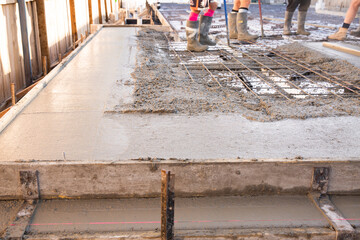Driveways are a vital component of any property, serving as the primary point of access for vehicles and pedestrians. They are constantly exposed to traffic, weather, and natural wear, which can lead to cracks, potholes, uneven surfaces, and other forms of damage. A damaged driveway not only diminishes the visual appeal of a property but also poses safety risks for both residents and visitors. Investing in reliable driveway repair solutions ensures that these surfaces are restored to optimal condition, combining functionality with enhanced curb appeal. Understanding the importance of professional Driveway Repair Nashville and the common signs of damage, and the methods used by experts, is essential for property owners who want long-lasting and aesthetically pleasing driveways.

One of the key benefits of professional driveway repair services is the ability to address both surface and structural issues effectively. Driveways may be constructed from a variety of materials, including concrete, asphalt, or pavers, each requiring specific repair techniques. Professionals assess the type of surface, evaluate the extent of damage, and recommend the most suitable repair method. Common solutions include crack filling, pothole repair, resurfacing, and, in some cases, full-depth reconstruction. By addressing the underlying issues in addition to visible surface damage, experts ensure that repaired driveways are durable, safe, and capable of withstanding continued use for years.
Identifying early signs of driveway damage is critical to preventing more extensive and costly repairs. Cracks, depressions, water pooling, and erosion along the edges are common indicators that a driveway requires attention. Left untreated, these issues can expand, leading to uneven surfaces, compromised structural integrity, and potential safety hazards. Professional contractors conduct thorough inspections, analyzing both visible damage and the condition of the underlying base and substructure. This comprehensive approach allows for repairs that not only restore the surface but also strengthen the foundation, ensuring long-term reliability.
Safety is a primary concern when it comes to driveway maintenance and repair. Uneven surfaces, deep cracks, and potholes pose risks to vehicles and pedestrians. Vehicle tires can sustain damage, and pedestrians may face tripping hazards. Reliable driveway repair solutions restore a smooth and stable surface, reducing the risk of accidents and ensuring safe access. Additionally, professional contractors consider proper grading and drainage during the repair process, preventing water accumulation and minimizing the risk of future erosion or settling. These measures enhance both safety and functionality, making professional repairs a worthwhile investment.
Aesthetics also play a significant role in the value and appeal of a property. A well-maintained driveway contributes to curb appeal and creates a positive first impression for visitors and potential buyers. Conversely, a damaged or neglected driveway can detract from the appearance of the entire property. Professional repair services use high-quality materials and advanced techniques to restore both the structural integrity and visual appeal of the driveway. Options such as stamped concrete, decorative asphalt overlays, and resurfaced concrete allow property owners to achieve an attractive finish that complements the surrounding architecture and landscaping.
Timely intervention is essential for cost-effective driveway maintenance. Minor cracks or surface imperfections may seem insignificant at first, but can worsen over time due to weather cycles, heavy traffic, and soil movement. Addressing these issues promptly prevents further deterioration and reduces the need for more extensive and expensive repairs. Professional driveway repair solutions provide durable, long-lasting results while protecting the overall investment in the property. Routine inspections and preventative maintenance are key strategies for preserving driveway functionality and appearance.
Repair methods vary depending on the material, type of damage, and overall condition of the driveway. For concrete driveways, professionals may use crack injection, patching, resurfacing, or slab stabilization techniques. Asphalt driveways often require crack filling, pothole repair, or overlay treatments to restore a smooth surface. For driveways constructed with pavers or interlocking stones, contractors may reset uneven sections, replace damaged units, and ensure proper alignment. Each method is selected based on the specific needs of the driveway, ensuring structural stability, visual appeal, and long-term durability.
Proper preparation is a crucial step in achieving successful driveway repair. Professionals evaluate the condition of the base, soil, and drainage before beginning any repair work. This preparation ensures that the repaired surface is supported by a stable foundation, reducing the likelihood of future cracks or settling. Contractors also implement preventative measures, such as sealants, protective coatings, and edge reinforcement, to protect against weather-related damage and heavy traffic. These measures enhance the longevity and performance of the driveway, reducing maintenance requirements and maintaining its aesthetic appeal.
Durability and longevity are central objectives of reliable driveway repair services. Using high-quality materials, expert workmanship, and appropriate repair techniques, professionals create surfaces that can endure daily use and environmental stress. Properly repaired driveways resist cracking, erosion, and surface wear, ensuring consistent performance over the years. Attention to detail, including proper grading and drainage, prevents water damage and uneven settling, which are common causes of long-term deterioration. This meticulous approach guarantees that driveways remain functional, safe, and visually appealing for decades.
Efficiency is another advantage of hiring professional driveway repair services. Although driveway repairs may appear straightforward, they require experience, specialized tools, and knowledge of materials and techniques to achieve optimal results. Professionals streamline the repair process, completing projects within a scheduled timeframe while ensuring high-quality outcomes. This efficiency minimizes disruption to daily activities and allows property owners to use the driveway safely as soon as repairs are completed. By combining skill with efficiency, professionals provide both convenience and durable results.
Environmental considerations are increasingly important in modern driveway repair projects. Contractors select materials and techniques that are environmentally responsible while maintaining durability and performance. Proper management of runoff, erosion, and drainage prevents environmental damage and protects surrounding areas. By implementing sustainable practices, professional driveway repair solutions not only restore functionality but also align with environmentally conscious property management standards.
Customer satisfaction is a priority for professional driveway repair services. Experienced contractors provide clear communication throughout the repair process, from initial inspection to project completion. Property owners are informed about recommended repairs, costs, materials, and expected outcomes, enabling them to make confident decisions. Transparent processes ensure that repairs meet client expectations and provide peace of mind. Reliable contractors may also offer follow-up services, addressing any post-repair concerns and providing guidance for ongoing maintenance to preserve the driveway’s performance and appearance.
Preventive maintenance is an important aspect of reliable driveway repair solutions. Sealing, resurfacing, and routine inspections help protect driveways from weather, chemical exposure, and daily wear. Regular maintenance prevents small issues from escalating into major structural problems and extends the lifespan of the driveway. Professionals advise property owners on appropriate maintenance schedules, materials, and techniques to maximize performance, minimize repair costs, and maintain curb appeal over time.
To summarize, reliable driveway repair solutions offer several key benefits for property owners seeking to restore both functionality and visual appeal:
- Structural Stability: Repairs address surface and foundational issues to create a durable, long-lasting driveway.
- Safety: Smooth and even surfaces reduce hazards for vehicles and pedestrians.
- Aesthetic Enhancement: High-quality materials and finishing techniques restore curb appeal and complement the property’s appearance.
- Cost Efficiency: Timely repairs prevent more extensive damage and reduce future maintenance costs.
- Longevity and Durability: Expert workmanship, proper materials, and preventative measures ensure reliable performance over time.
In conclusion, driveways are a crucial aspect of property functionality and curb appeal, but they are subject to wear, damage, and environmental stress. Professional driveway repair solutions address these challenges by restoring structural integrity, enhancing safety, and improving visual appeal. Timely repairs, expert techniques, and high-quality materials ensure long-lasting results that maintain both performance and aesthetic value. Property owners who invest in reliable driveway repair services benefit from smooth, durable surfaces that withstand daily use and environmental conditions, protect the property investment, and create an inviting and well-maintained exterior. By prioritizing professional repair solutions, homeowners and businesses alike can enjoy a driveway that is both functional and visually appealing for years to come.
